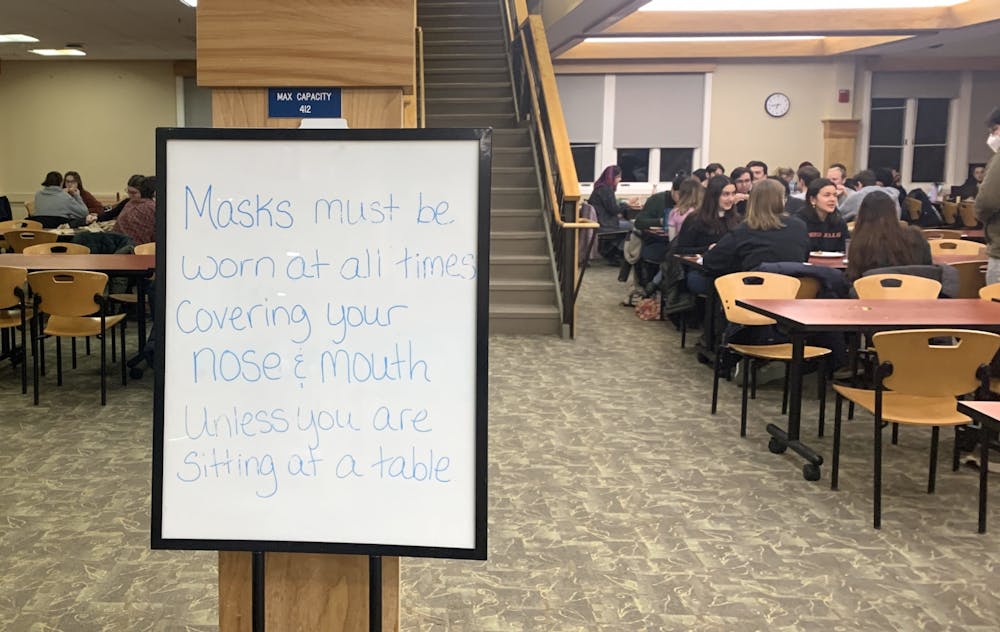Middlebury’s new mask policy, which eliminates the mask mandate in all indoor spaces except classrooms and a few other designated areas, went into effect on Friday, March 18 at 3:00 p.m. The policy states that masks are optional, which means that those who wish to continue wearing masks may do so.
An email sent to all Middlebury students, faculty and staff through the Middlebury Updates network on March 9 said, “masks are welcome and encouraged for anyone who wishes to continue to wear a mask. We ask that community members exercise kindness, compassion, and patience toward others in support of their personal choices.”
Smita Ruzicka, Vice President for Student Affairs, said that the mask policy change may help open doors to further strengthen the Middlebury community.
“We are hoping that this sort of starts relieving some of the burden around learning, the student experience, and for folks to sort of gather in community,” she said.
Ruzicka hopes that future endemic management will allow students to share more meaningful interactions with peers while simultaneously ensuring that all community members feel their health and safety are valued as a priority.
Ruzicka also notes that the impetus for the mask policy change was motivated by the State of Vermont’s removal of the indoor mask mandate, including in schools, which occurred on March 14. The masking remains optional to consider those who may be more at risk or may feel more comfortable continuing to wear a mask.
“We are a community that wants to support your choice in terms of whether or not you want to be masked or not,” Ruzicka said.
This change in policy highlights Middlebury’s attempt to shift from a top-down approach regarding Covid-19 matters to a more community-based approach. While the administration was previously responsible for organizing testing, isolation and preventing the spread of the virus, these duties now rest on the community. The widespread allocation of antigen tests is intended to allow students to test — and stay away from gatherings — when they have symptoms, and to isolate if they test positive. When planning events, organizers are encouraged to think of all the ways they can keep themselves and those attending stay safe. The administration is also handing over responsibility for contact tracing to individual community members.
“Students and employees [who test positive] will be responsible for notifying their friends, professors, classmates and others if they were in close proximity with or without masks for longer than a cumulative total of 15 minutes or more in a 24-hour period,” the college wrote in a Middlebury Updates email to the school.
In designing this new policy, the Middlebury administration consulted with the Faculty Council as well as numerous individual faculty and staff members to gather a wide range of opinions on the matter.
“But then we also incorporated that feedback into how the state of Vermont is moving, [and] what would be in the best interest of our community in general,” Ruzicka said. Integrated into this decision was the consideration and protection of those who were most vulnerable in the Middlebury community.
“We wanted to also give departments and specific buildings and areas the agency and autonomy to decide whether or not they wanted to require masks in their settings,” Ruzicka said. Buildings and spaces in which masks are required will display the proper signage to indicate this to students and faculty.
There are, however, certain places in which the mask mandate will remain in place. These include classrooms as well as other designated areas such as Parton Health Center.
The gathering size limit for student events had already been lifted earlier in the spring, but this new policy will now allow organizers to offer food at their events. The lifting of the mask mandate also encourages a return to typical spring events. Ruzicka notes that MCAB is currently planning to bring speakers to campus and organize a spring concert.
“We are really encouraging both our student organizations as well as departments to do the events they typically do in this time of year,” Ruzicka said.
Future changes to the current mask policy, including a removal of the mask mandate in classes, rely on the state of the community during this current policy and changing policies in Vermont.
“Our hope is that we are trying to be on the road to endemic management and part of that is really trying to get out of a lot of restrictive policies and prescriptive protocols,” Ruzicka said.
According to Ruzicka, Middlebury is in frequent communication with peer institutions in Vermont, as well as state health leaders and stakeholders, to guide their decisions. There is not a known date in which the campus might adopt a fully mask-optional policy, though Ruzicka and the Middlebury administration are hopeful that this might be the case in the future.

Emily Hogan '24 (she/her) is a Local Editor.
She is studying Environmental Policy with a minor in Math. In addition to writing and editing for the Campus, she also dances with the On Tap dance troupe and serves on the Environmental Council. She has previously worked with the Sustainability Solutions Lab at Middlebury.




